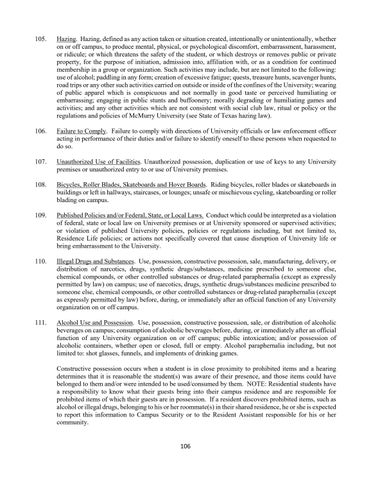105.
Hazing. Hazing, defined as any action taken or situation created, intentionally or unintentionally, whether on or off campus, to produce mental, physical, or psychological discomfort, embarrassment, harassment, or ridicule; or which threatens the safety of the student, or which destroys or removes public or private property, for the purpose of initiation, admission into, affiliation with, or as a condition for continued membership in a group or organization. Such activities may include, but are not limited to the following: use of alcohol; paddling in any form; creation of excessive fatigue; quests, treasure hunts, scavenger hunts, road trips or any other such activities carried on outside or inside of the confines of the University; wearing of public apparel which is conspicuous and not normally in good taste or perceived humiliating or embarrassing; engaging in public stunts and buffoonery; morally degrading or humiliating games and activities; and any other activities which are not consistent with social club law, ritual or policy or the regulations and policies of McMurry University (see State of Texas hazing law).
106.
Failure to Comply. Failure to comply with directions of University officials or law enforcement officer acting in performance of their duties and/or failure to identify oneself to these persons when requested to do so.
107.
Unauthorized Use of Facilities. Unauthorized possession, duplication or use of keys to any University premises or unauthorized entry to or use of University premises.
108.
Bicycles, Roller Blades, Skateboards and Hover Boards. Riding bicycles, roller blades or skateboards in buildings or left in hallways, staircases, or lounges; unsafe or mischievous cycling, skateboarding or roller blading on campus.
109.
Published Policies and/or Federal, State, or Local Laws. Conduct which could be interpreted as a violation of federal, state or local law on University premises or at University sponsored or supervised activities; or violation of published University policies, policies or regulations including, but not limited to, Residence Life policies; or actions not specifically covered that cause disruption of University life or bring embarrassment to the University.
110.
Illegal Drugs and Substances. Use, possession, constructive possession, sale, manufacturing, delivery, or distribution of narcotics, drugs, synthetic drugs/substances, medicine prescribed to someone else, chemical compounds, or other controlled substances or drug-related paraphernalia (except as expressly permitted by law) on campus; use of narcotics, drugs, synthetic drugs/substances medicine prescribed to someone else, chemical compounds, or other controlled substances or drug-related paraphernalia (except as expressly permitted by law) before, during, or immediately after an official function of any University organization on or off campus.
111.
Alcohol Use and Possession. Use, possession, constructive possession, sale, or distribution of alcoholic beverages on campus; consumption of alcoholic beverages before, during, or immediately after an official function of any University organization on or off campus; public intoxication; and/or possession of alcoholic containers, whether open or closed, full or empty. Alcohol paraphernalia including, but not limited to: shot glasses, funnels, and implements of drinking games. Constructive possession occurs when a student is in close proximity to prohibited items and a hearing determines that it is reasonable the student(s) was aware of their presence, and those items could have belonged to them and/or were intended to be used/consumed by them. NOTE: Residential students have a responsibility to know what their guests bring into their campus residence and are responsible for prohibited items of which their guests are in possession. If a resident discovers prohibited items, such as alcohol or illegal drugs, belonging to his or her roommate(s) in their shared residence, he or she is expected to report this information to Campus Security or to the Resident Assistant responsible for his or her community. 106


